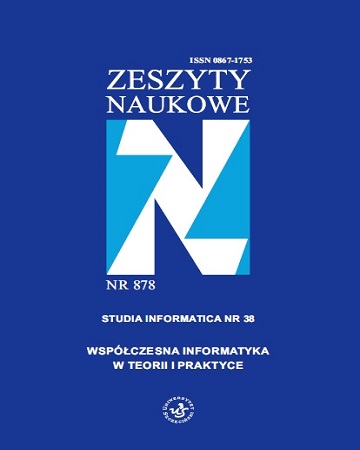
ISSN: 0867-1753
eISSN: 2300-410X
OAI
DOI: 10.18276/si.2015.38-13


Issue archive /
ZN 878 SI nr 38
Gamifikacja e-learningu w kontekście zróżnicowania typów uczestników
(Gamification of e-learning in the context of participant type diversity)
| Authors: |
Jakub
Swacha
Uniwersytet Szczeciński, Wydział Nauk Ekonomicznych i Zarządzania, Instytut Informatyki w Zarządzaniu |
| Keywords: | e-learning gamification participant typology |
| Data publikacji całości: | 2015 |
| Page range: | 10 (179-188) |
Abstract
The paper addresses the issues of implementing gamification in e-learning courses in the context of participant type diversity. It lists the key elements shared by games and education, describes how they can be implemented in e-learning, explains the typology of gamified system users, and suggests means of implementation of key gamification elements adequate for respective participant types, characterized by specific kind of intrinsic or extrinsic motivation.
Download file
Article file
Bibliography
| 1. | Bartle R.A. (1996), Hearts, clubs, diamonds, spades: Players who suit MUDs, „Journalof MUD Research”, vol. 1(1), http://www.mud.co.uk/richard/hcds.htm (1.06.2015). |
| 2. | Bogost I. (2011), Persuasive Games: Exploitationware, „Gamasutra”, http://www.gamasutra.com/view/feature/134735/persuasive_games_exploitationware.php |
| 3. | (1.06.2015). |
| 4. | Byl P. de, Hooper J. (2013), Key Attributes of Engagement in a Gamified Learning Environment, w: Electric Dreams, Macquarie University, Sydney, s. 221–230. |
| 5. | De-Marcos L., Domínguez A., Saenz-de-Navarrete J., Pagés C. (2014), An empirical study comparing gamification and social networking on e-learning, „Computers & Education”, vol. 75, s. 82–91. |
| 6. | Deterding S., Dixon D., Khaled R., Nacke L. (2011), From game design elements to gamefulness: defining „gamification”, Proceedings of the 15th International Academic MindTrek Conference, ACM, New Jork, s. 9–15. |
| 7. | Kapp K.M. (2012), The Gamification of Learning and Instruction: Game-Based Methods and Strategies for Training and Education, Pfeiffer, San Francisco. |
| 8. | Laskowski M. (2013), Wykorzystanie czynników grywalizacyjnych w tworzeniu aplikacji użyteczności publicznej, „Nierówności Społeczne a Wzrost Gospodarczy”, nr 36, s. 23–30. |
| 9. | Marczewski A. (2013), A Player Type Framework for Gamification Design, „ Gamified UK”, http://www.gamified.uk/user-types (1.06.2015). |
| 10. | McGrath N., Bayerlein L. (2013), Engaging online students through the gamification of learning materials: The present and the future, w: Electric Dreams, Macquarie University, Sydney, s. 573–578. |
| 11. | Nelson M.J. (2012), Soviet and American Precursors to the Gamification of Work, Proceedings of the 16th International Academic MindTrek Conference, ACM, Tampere, s. 23–26. |
| 12. | Pink D.H. (2011). DRIVE. Kompletnie nowe spojrzenie na motywację, Studio Emka, Warszawa. |
| 13. | Rowgało K. (2014), Gamifikacja – co to, po co, jak działa?, „HR standard.pl”, http://hrstandard.pl/2014/03/03/gamifikacja-co-to-po-co-jak-dziala (1.06.2015). |
| 14. | Ryan R.M., Deci E.L. (2000), Self-determination theory and the facilitation of intrinsic motivation, social development, and well-being, „The American Psychologist”, vol. 55, s. 68–78. |
| 15. | Schacht M., Schacht S. (2012), Start the Game: Increasing User Experience of Enterprise Systems Following a Gamification Mechanism, w: Software for People, red. A. Maedche, A. Botzenhardt, L. Neer, Springer, Berlin–Heidelberg, s. 181–199. |
| 16. | Swacha J. (2014), Gamifikacja: nowe narzędzie motywowania, w: Perspektywy zarządzania zasobami ludzkimi, red. A. Rakowska, Instytut Zarządzania UMCS, |
| 17. | Lublin, s. 292–303. |
| 18. | Swacha J., Baszuro P. (2013), Gamification-based e-learning platform for computer programming education, w: Learning while we are connected, vol.1: Research papers, red. N. Reynolds, M. Webb, Wydawnictwo Naukowe UMK, Toruń, s. 122–130. |
| 19. | Tkaczyk P. (2012), Grywalizacja. Jak zastosować mechanizmy gier w działaniach marketingowych, Helion, Gliwice. |
| 20. | Werbach K., Hunter D. (2012), For the Win: How Game Thinking Can Revolutionize Your Business, Wharton Digital Press, Filadelfia. |